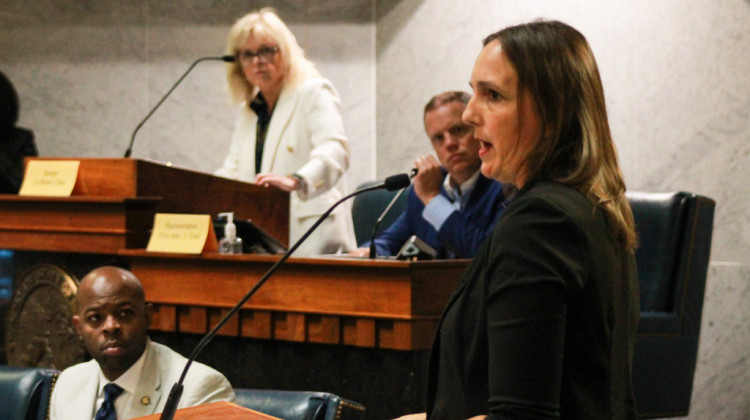
Indiana Community Action Poverty Institute Director Erin Macey, right, testified before a legislative study committee on the issue of medical debt on Aug. 18, 2025.
Brandon Smith / IPB NewsIndiana ranks 11th highest in the nation for the number of residents with medical debt in collections, according to the Urban Institute.
State lawmakers, leaders and advocates took a "first step" Monday in exploring the issue of medical debt and potential solutions.
Advocates said Hoosiers have an estimated $2.2 billion of medical debt in collections. And they say that debt causes people to delay or forgo care and strains their ability to pay for other necessities.
"As one person we interviewed about [wage] garnishments put it, 'I was having to borrow money in order to make my car payment. I was borrowing money and selling things in order to make my phone bill. I was hardly eating,'" said Indiana Community Action Poverty Institute Director Erin Macey.
Dave Almeida is with the Leukemia and Lymphoma Society. He said part of the solution is better education about billing appeals, payment plan options and charitable support.
Almeida said Indiana lawmakers should also address what he calls "egregious collection practices."
"Such as the seizure of a primary residence or a primary vehicle or the seizure of income through wage garnishment and capping interest rates on outstanding balances," Almeida said.
READ MORE: Medical debt protections against wage garnishment, primary residence liens fail in Senate
Join the conversation and sign up for our weekly text group: the Indiana Two-Way. Your comments and questions help us find the answers you need on statewide issues, including our project Civically, Indiana.
But collection industry leaders like Heather Gilb said wage garnishments and liens are what ensure debt collection is possible.
"The better solution is to preserve reasonable collection tools while ensuring that the safeguards already in place are promoted, understood and used to their fullest potential," Gilb said.
Gilb said an example of those safeguards is the existing cap on wage garnishment that limits it to between 10 percent and 25 percent of a person's take-home pay.
Attorney Joseph Walterman, who said he's often represented creditors and in some cases consumers in court, proposed what he called a "middle of the road approach."
"If our courts already have discretion down to 10 percent, the committee could simply say, 'We're going to limit medical garnishments to 10 percent if the consumer asks,'" Walterman said.
Rick Rainho from the Indiana Collections Association painted a dire picture for lawmakers if wage garnishments and liens aren't allowed for medical debt.
"If we dismantle debt collection tools, the entire health care system becomes unstable," Rainho said.
Rainho said the real problem is the high cost of health care. United Way of Central Indiana Vice President Sam Snideman said tackling the issue requires broad input.
"Addressing the high costs of care, addressing medical debt will take government, health care, the philanthropic sector and community partners coming to the table to address it," Snideman said.
The legislative study committee that took testimony on the issue Monday could issue a recommendation later this year.
Brandon is our Statehouse bureau chief. Contact him at bsmith@ipbs.org or follow him on Twitter at @brandonjsmith5.
 DONATE
DONATE






 Support WFYI. We can't do it without you.
Support WFYI. We can't do it without you.